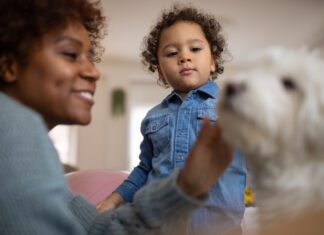Occasionally a mother dog gives birth to just one puppy – often called a “singleton” pup. Fortunately it’s a relatively rare occurrence, although more likely to occur in small breeds, as they tend to have smaller litters anyway. Sometimes called “single puppy syndrome,” this can result in lifelong behavior challenges for the unfortunate baby dog who has no siblings to teach her important social skills. The good news is that while your singleton pup may offer you some behavioral challenges, she is not likely to suffer from significant health issues as a result of her singleton status.
Why Does Single Puppy Syndrome Happen?
A puppy’s critical socialization period occurs from 3 weeks of age to 12 to14 weeks. During this time puppies crawl over each other, play together, and squabble over access to mom’s milk bar.
Puppies bite each other in play, and if one bites too hard the other pup may yelp and stop playing. This is how puppies learn bite inhibition. Without littermates to teach this behavior, a puppy doesn’t learn to control her mouth pressure – much to the dismay of her future human family.
Other problems commonly found in singleton pups include being unable to problem-solve calmly, low tolerance for frustration, poor social skills, poor impulse control, and sensitivity to touch and handling.
What if I Have a Singleton Puppy?
Ideally the breeder of a singleton pup will find another similar-age litter with which to spend those first weeks so she has more normal experiences as a young puppy. If this didn’t happen, you’ll need to teach bite inhibition and handle your puppy a lot to avoid touch sensitivity issues. Have her spend time with other similar age and size puppies as much and as early and as often as possible during the first 12 weeks so she learns social skills.
If it’s too late for that, plan on doing extra behavior modification work to help your pup overcome her early social deprivation – lots of interaction with socially appropriate dogs, conditioning to handling, redirecting her hard mouth to toys, and teaching her to bite only gently. (See: “Teaching Your Puppy Bite Inhibition” and “How to Train Your Dog to Accept Husbandry Chores“).







I couldn’t agree more about the challenges of a singleton puppy. I have one – I bred him and have lived with him every day of his life. When he was very young, a family member had a serious illness and we had to be out of the house for treatment; as a result, this puppy (and our other dogs) was left with a house sitter who, while an extremely nice person, had no ability to socialize this puppy. Through no fault of his own, his littermate was a stuffed toy. He grew up reactive in the extreme to other dogs. I have spent the last 11 1/2 years (and probably thousands of dollars) doing training, swimming with him in a doggy pool, counter conditioning and whatever else you can think of to reduce this problem. He’s finally a bit calmer but that has only come with time and medication. Get ALL puppies out there early and often and don’t under-estimate the importance of those early experiences; in my view, they’re crucial to success for the dog’s entire life.
I have found that raising singletons around all of my dogs of all ages mitigates these “unwanted” behaviors. My current singleton is now 3.5 months and has a rock solid temperament, excellent focus and problem solving skills, calmness when she should be calm. She learned bite inhibition from the older pups/dogs who put her in her place as well as through me in play. She is confident and intuitive and very well adjusted. Having raised 19 singletons over the course of 45 years, I prefer them to large litters. It just takes more focus and time from the breeder.
Single puppies don’t have to go through this. Granted, Nick is a Newfoundland, not prone to impulsive behavior, always likes to weigh alternatives. Now seven years old, the kindest, most social dog you would ever want to meet..Has his CGC. He had a little sister in utero who died at birth, which I’ve read makes a difference. He had a very calm, experienced mother with firm ideas about how puppies should behave. His breeder was also great about socializing puppies, and provided an adopted sister in the early weeks. As a teen, he went to a wonderful dog socializing program run by the Humane Society which at that time was open to community dogs without behavioral problems (now just for their HS dogs) . He is big , even for a Newf. As a well loved dog park regular with a core pack and new dogs in and out, he’s had to learn how to play with dogs of different sizes and temperaments. It did take him a while to understand that not every dog he met was the last dog on the planet and that not every dog wanted to play with him. A people dog, too. Once when he was younger a little boy ran straight at him and grabbed his head.. I said be careful, you can’t do that to most dogs, He said, I know that. But I know Nicky and he knows me, and Nicky would never hurt me. .